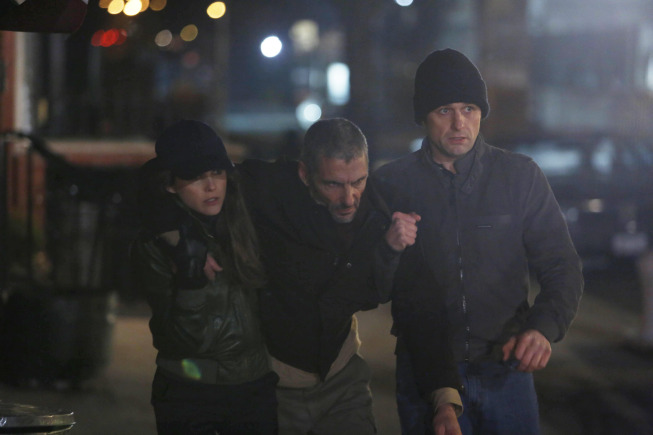
Brief spoilers for last night’s The Americans follow:
“We spent the night together and I don’t even know your name. But your name isn’t your name, is it? Is your face your face? Are your children your children?”
“The Deal” was the last of the five episodes of The Americans I saw before the beginning of this season, and it was the best example so far of how season 2 has deepened the characterization of Philip and Elizabeth while reminding us that, nonetheless, they are hard people doing bad things. And while we began the season watching Philip killing two Afghan contacts, then murdering an innocent kitchen worker who spotted him, I’m not sure he’s been more monstrous–to borrow Anton’s term–or more pitiable.
As the capture of the Mossad agent and physicist Anton played out, “The Deal” gave an ugly shading to Philip’s character by having him make some off-handedly anti-Semitic remarks: “You throw some shekels his way too?”; “So is this what you Jews do, spy on your friends?” and so on. Words are not bullets, of course, but the volition of his remarks reminds us that we should only sympathize with him so far. Lying, threatening, killing–those are nasty things, but at least something the Directorate S agents do out of some patriotic ideal. They’re things he has to do. Sneering about “shekels” is something he chooses to do.
It’s a hard truth, but it’s not the whole picture. Though Philip may distance himself from his charges, he also has things in common with them. His battle with the Mossad agent in the bathroom, for instance, ends with an exhausted moment of rapport between them: they’re both professionals, doing their jobs, and each knows he’d do what the other does in his situation.
The trade of Anton is one of the most wrenching things The Americans has shown–it’s emotionally excruciating if not physically violent, as the scientist goes through stages of denial, bargaining, and despair, breaking down horribly in the back seat as he tries to hit Philip with the one weapon he might possibly have: an appeal to his captor’s humanity. And while it’s bound not to work, this gripping scene shows that it does hurt. “At least look at me!” he pleads. “Please! You’re a monster! You’re not a man! Whoever you once were, whatever you were, they trained it out of you. No feeling, no humanity, you may as well be dead.”
We watch Philip through the rain-slicked glass of the windshield, and maybe we don’t see a monster, but we see a man trying to compel himself to be one, long enough for this to be over. We know enough of Philip to know that the Frankenstein-like deadness on his face his to be willed, and has to take physical effort to maintain. However he treats Anton (whose abduction, after all, he’d advised against), he hasn’t trained the humanity out of himself. He’s also in the same position, separated from his home. Anton is being shipped to the Soviet Union as part of a larger deal; Philip sent Mischa away as part of his role in a larger game.
“The Deal” also, of course, complicated the intra-agency intrigue at the Rezidentura and advanced the season’s other threads in a way that made me eager to see more. (Elizabeth’s heart-to-heart with Martha about her “brother” Clark–“Can I be a little bit of a Betty Buttinsky?”–was painfully hilarious.) But it ended with the story at the show’s heart, which it’s deepened wonderfully so far this year: two spouse-partners lying together, sharing the one moment of honest memory they can, trying to forget their sins and pining for the icicles of home.
More Must-Reads from TIME
- Donald Trump Is TIME's 2024 Person of the Year
- Why We Chose Trump as Person of the Year
- Is Intermittent Fasting Good or Bad for You?
- The 100 Must-Read Books of 2024
- The 20 Best Christmas TV Episodes
- Column: If Optimism Feels Ridiculous Now, Try Hope
- The Future of Climate Action Is Trade Policy
- Merle Bombardieri Is Helping People Make the Baby Decision
Contact us at letters@time.com